In this pandemic, why can't we have multiple locations for various disciplines, all of it then merged into a virtual convergence called the Olympics instead of one massive event in one city, asks Shyam G Menon.
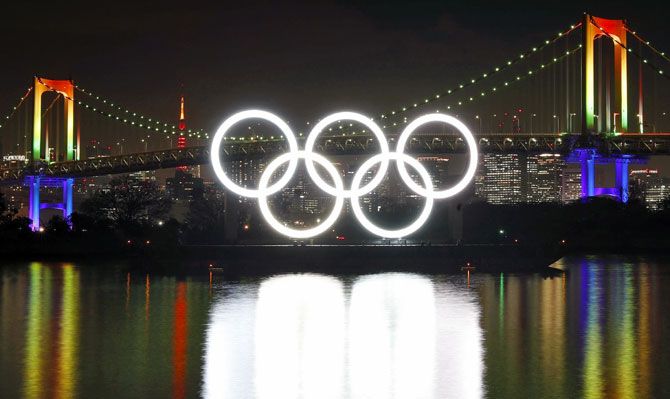
As of early June, the 2020 Tokyo Olympics, slated for July 23-August 8, 2021, was still a picture of uncertainty in the media.
Amidst world battling pandemic and vaccination underway, the arguments in favour of holding the Games were:
The massive investment incurred by Japan, which would face delay in being recouped should the Olympics not be held.
Media reports from 2019 to late 2020, have pointed to an original forecast of $7.3 billion, a subsequent budget of $12.6 billion and unofficial estimates touching $26 billion.
If the Games are held successfully, it strengthens the hand of Japan's ruling dispensation. For some, it is probably a gamble worth taking.

The International Olympic Committee (wants to go ahead with the Games.
It has been positioned as a challenge to humanity in times of pandemic.
If we hold the Games, we demonstrate our collective resolve to overcome obstacles, something crucial and inspiring after months trashed by COVID-19.
Athletes worldwide have been preparing for the Games.
Despite the difficulties involved they have trained and qualified for the event; some have produced fantastic performances in competitions ahead of the Games. Their hard work goes wasted if the Games aren't held as expected.
Repeated rescheduling of the Games is not easy as the competition calendars of several disciplines have to be realigned accordingly. So, when the signal is green, go.
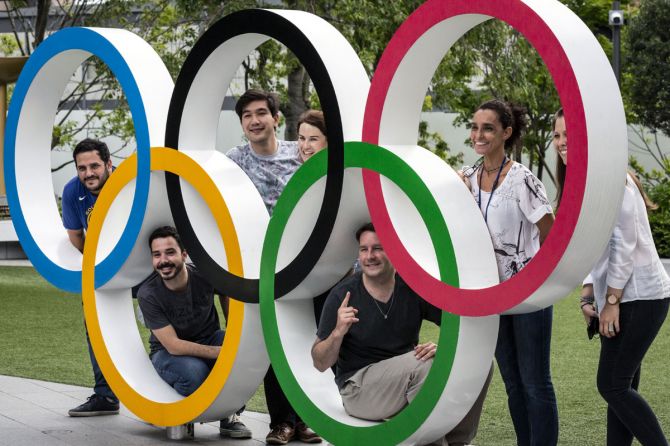
Arguments against holding the Games included:
Japan's predicament as a country with a known impact of COVID-19, the slow pace of vaccination and a population hosting one of the highest shares of senior citizens in the world.
Given the above COVID-19 scenario, the Japanese people are a divided lot as regards the Games happening as scheduled and wanting otherwise.
Should they take the risk of hundreds of athletes and officials from many countries congregating in Japan, even if all the visitors have been vaccinated?
In early June it was reported that 10,000 volunteers for the Olympics, from a pool of 80,000 registered, had resigned.
Overall, the impression building up was of the international community wishing for Japan to hold the Games so that the immediate world of athletes/sportspersons and the extended world of fans watching via the media can have their fill of sporting action. Not to mention, countries can win medals and endorse their sense of nationhood.
If this wasn't the Olympic Games but a visit to somebody's house instead, you wouldn't gatecrash. It is impolite to intrude if the host is reluctant.
While these were the Japan-specific concerns, there were others of a more general sort.
The current situation in the sport worldwide is that even as elite athletes manage to sustain their training in safe places with the support of their governments, the average sports lover is struggling to stay active or play a game.

Since December 2019, thanks to lockdowns, restrictions and attack by the virus in repeated waves, the world at large has sunk to a low level of indulgence in sports.
This has denied the active lifestyle its traditional ladder of sensate experience linking the world of amateur athletes with that of the elites.
Under normal circumstances, a lot of amateurs staying active, playing games and competing gives a sense of accessibility and organic progression from the ground level, up to elite sports. It is the fount of empathy anchoring elite performance as do-able.
This ladder stands broken at present. In 2020-2021, amidst sports calendars largely dried up, the few premier leagues broadcast on television and the Olympics scheduled in Japan possess the tenor of being exotic.
Consequently, it is relevant to ask what we should give priority to hold the Olympics as scheduled or free the active lifestyle and the global sports movement (at the apex of which is the Olympics) from the paralysis they sank into and kickstart the process all over again? Which should be important?
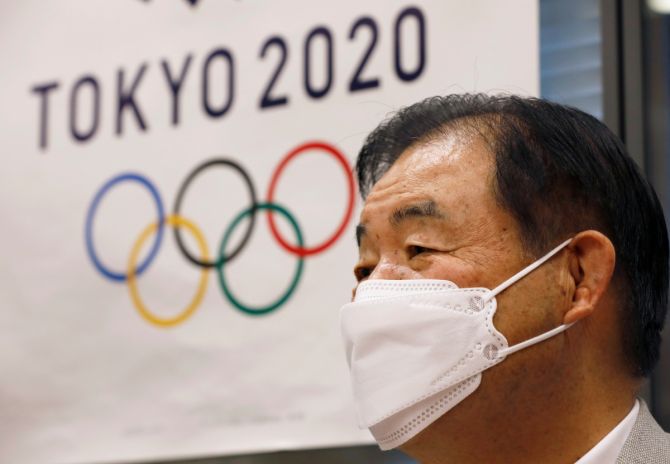
We can argue that the resumption of activity worldwide is precisely what holding the Olympics will achieve.
But do we feel comfortable forcing a single country -- Japan -- to be the guinea pig for the experiment?
Shouldn't we ideally share the onus, kickstart the active lifestyle in our own localities, let it gather momentum and then settle down to enjoying the Olympics?
While these questions got debated and the issue of the Olympics or not awaited clarity from the powers that be, there were older dimensions, continuing to haunt.
One such angle is what the Olympics have come to be. Is it the pinnacle of sport or is it an oversized agglomeration of various sports and games progressively losing focus except as regards its innate desire to dominate by scale?
An article in Time magazine ahead of the 2020 start of the since postponed Games said that the Tokyo event was slated to award medals across 339 events in 33 sports.
While we will unfailingly watch the Olympics on television and the Internet when it is staged, it is a different matter of how we value the contests staged within each discipline.
Less known sports and those with leagues having a smaller profile on the international broadcast scene, certainly gain as they ride the wave of attention being part of the Olympic movement provides. But not all sports are in this predicament.
Take athletics which has always been the main attraction of the Olympics.
Over the years, the world championships hosted by World Athletics (formerly International Association of Athletics Federations [IAAF]) have grown in stature.
As the pinnacle of its silo, it commands a loyal following. It may not eclipse the pull of athletics at the Olympic Games, but that day isn't far off although select disciplines -- the marathon, for example -- find better context at the Olympics.

In football, the FIFA World Cup is the undisputable crown.
The same goes for tennis, wherein the sport's iconic tournaments and the Grand Slam remain more central to it than the Olympics.
Cycling is weird. For it, nothing gets bigger than Tour de France.
What's more, every sport's link to the Olympics is optional; it is an arrangement executed via the sport's governing body. It is the latter that has firm roots in a given sport.
This makes the Olympics essentially a large brand factory sustained by its business model of tying up with various sports and converging the caravan to one city to keep the quadrennial Games afloat.
The business model is less apparent at world championships, where the organic link to sport is clearer.
For example, when World Athletics holds its world championships, it firmly indicates the aspiration of its member national athletics associations and the athletes aligned below it. This is what they live for.
Further, the focus is on person and excellence in sport as opposed to the political collective, s/he hails from.
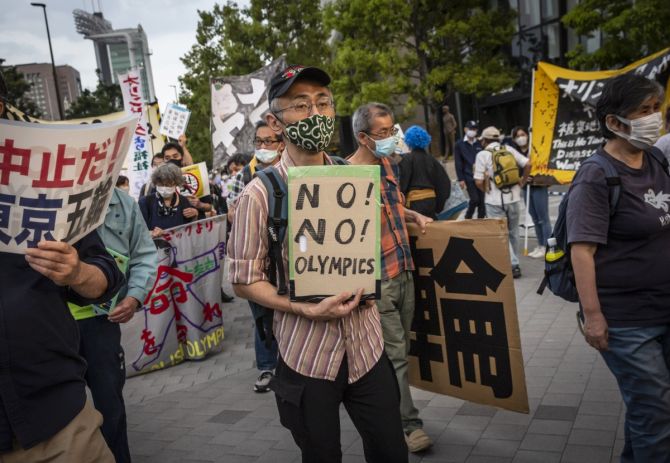
At the Olympics, national identity comes to the fore. It acquires hues other than sport.
During the Cold War years, the competition between the West and the Soviet bloc was keenly watched.
In the popular conscience, victories meant vindication of political ideology as well.
Today, the actors have changed, but the perception remains the same. And we are not considering here the fatigue around nationhood in times of human awareness gone global, the growing plague of authoritarian governments or some of us forced to compete as refugees.
The travelling world championships of every sport also pose another question relevant to the practice of the world converging on one city to celebrate the gigantic Olympics.
A legacy of world championships (as indeed the Olympics) and regional championships are those good facilities for select sports that are now available at various locations worldwide.
Plus, unlike in 1896 when the modern Olympic Games made their debut in Athens, the media has evolved into a globe-straddling entity capable of virtual convergence.
Why can't we have multiple locations for various disciplines, all of it then merged into a virtual convergence called the Olympics instead of one massive event in one city?
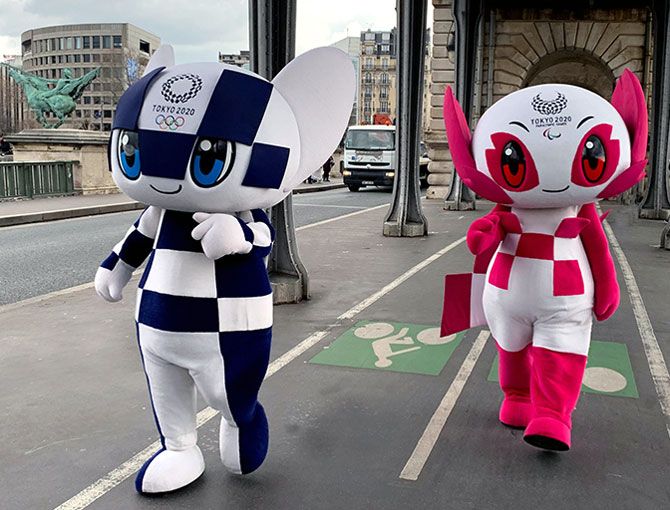
In fact, in pandemic-hit 2021, if the Olympic model was not built around one city but several cities across continents, we may have found more room to proceed with the event. While it will lack scale at any one place, such a multi-location model helps contain pandemic related risks because the number of athletes reporting is few and the tenure of competition, less.
None of these perspectives is new. They have been raised before.
The Tokyo Olympics, originally slated for 2020 and then forced by COVID-19 to be rescheduled to 2021, is the most compelling instance in recent times of the Olympic Games forced to introspect.
But has it?
Shyam G Menon is a Mumbai-based columnist.
Feature Presentation: Rajesh Alva/Rediff.com











 © 2025
© 2025